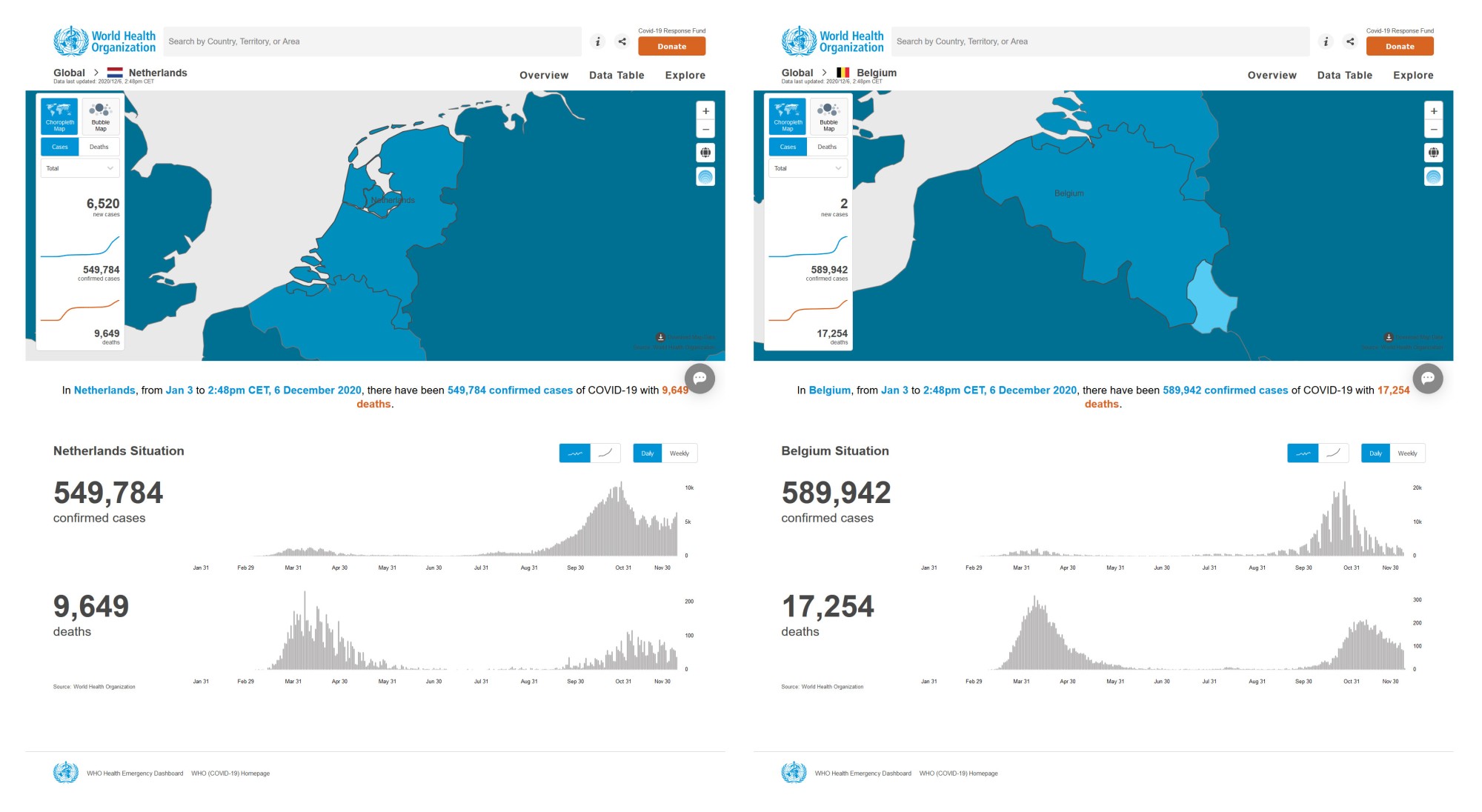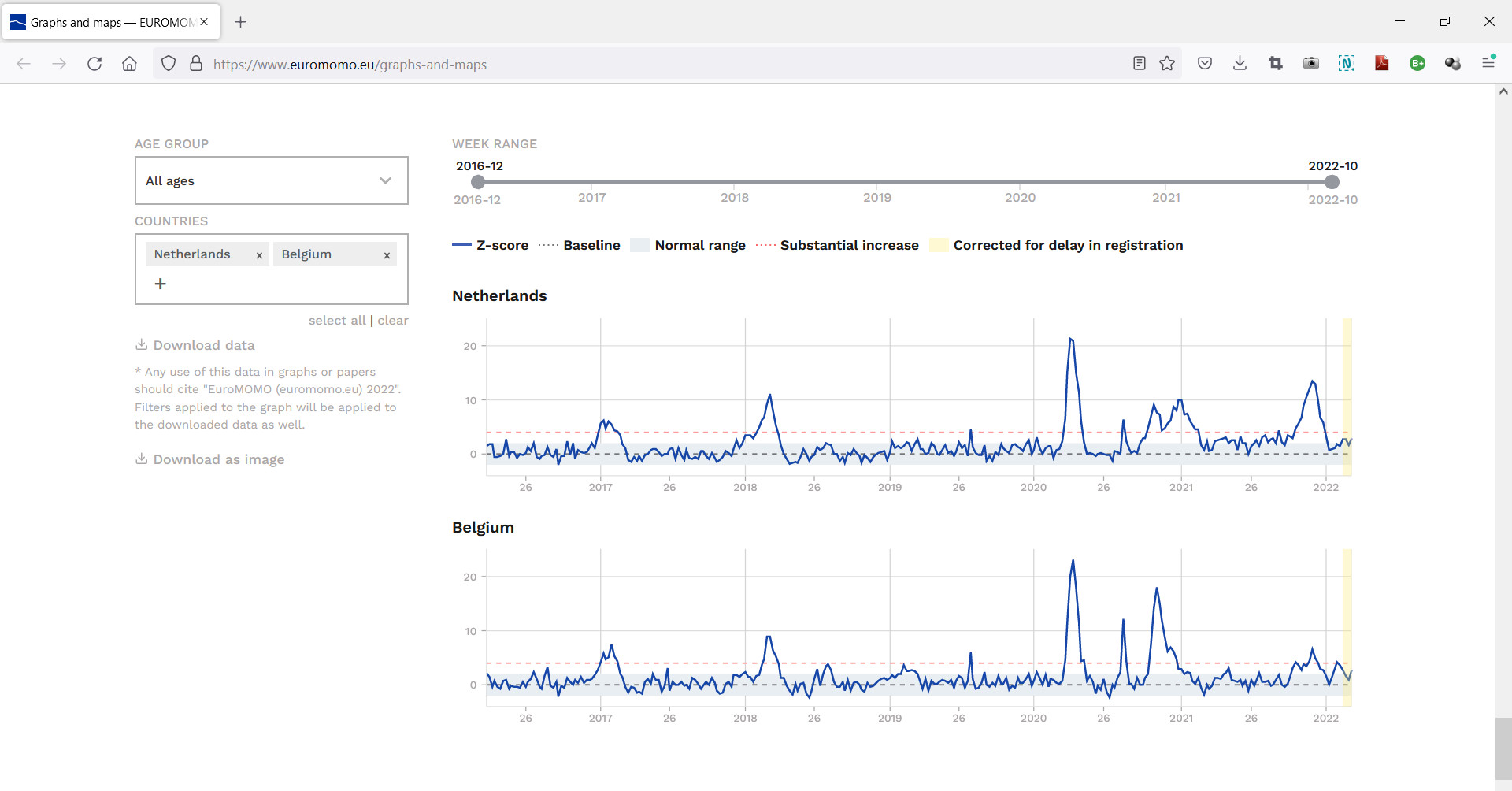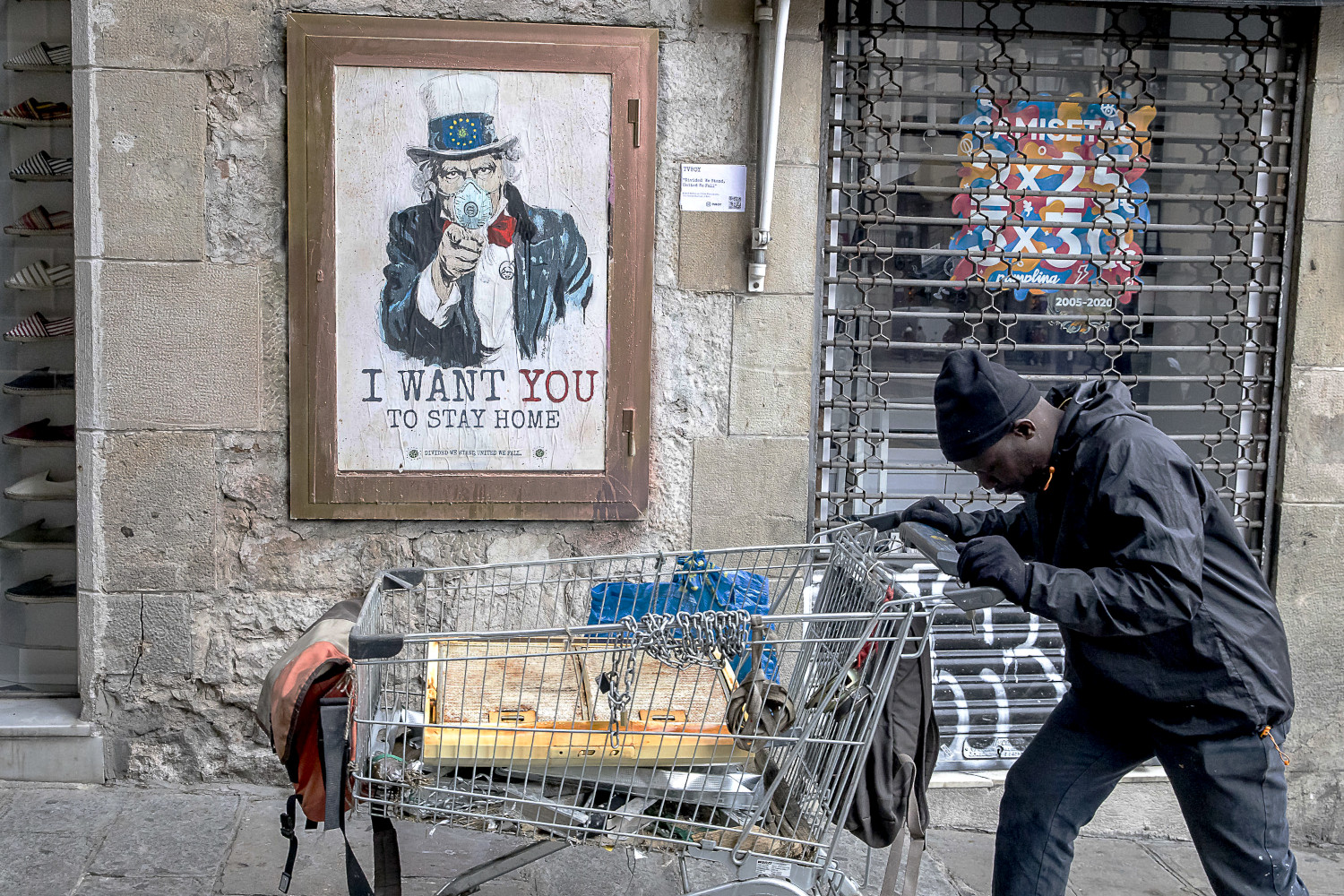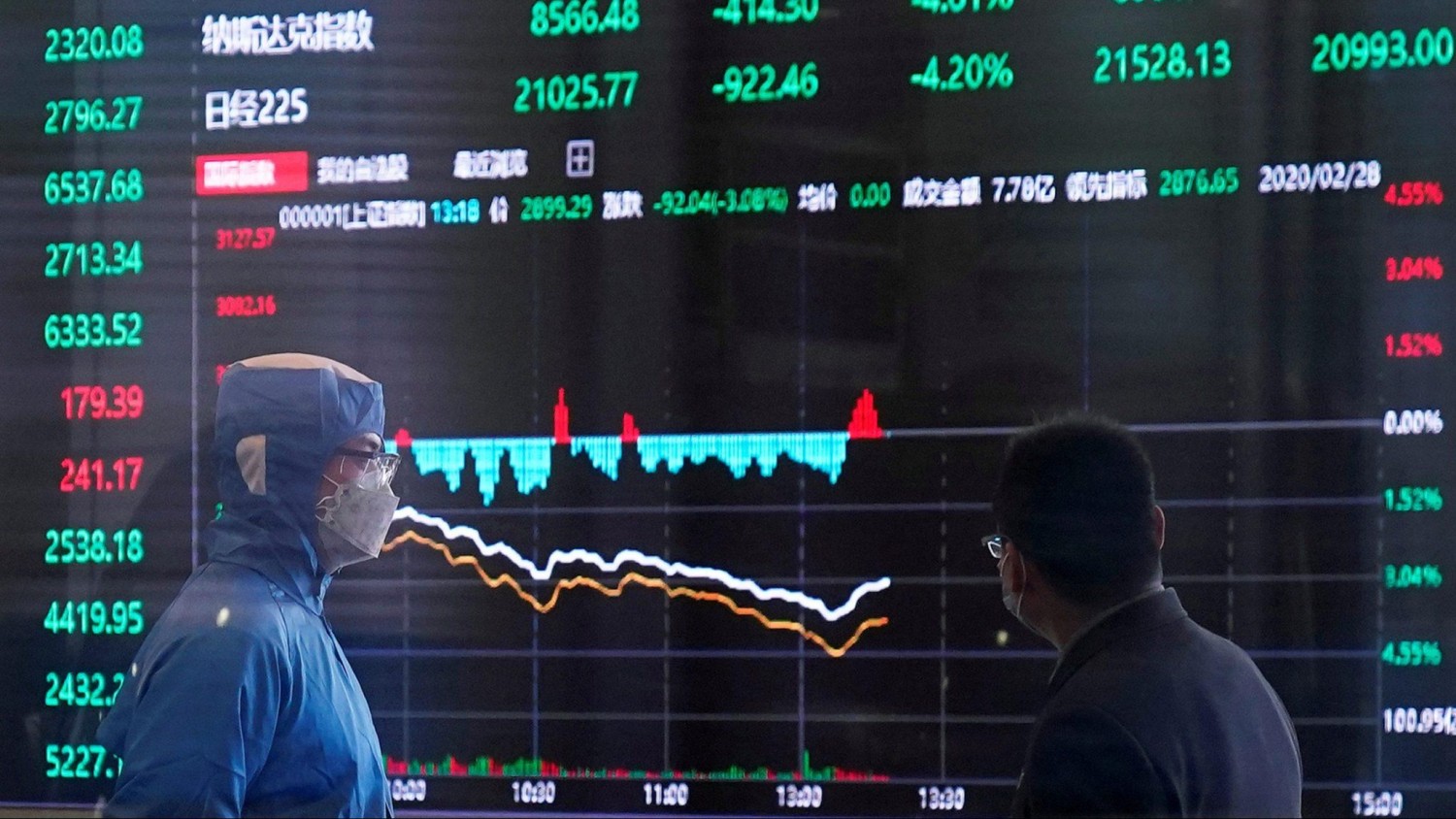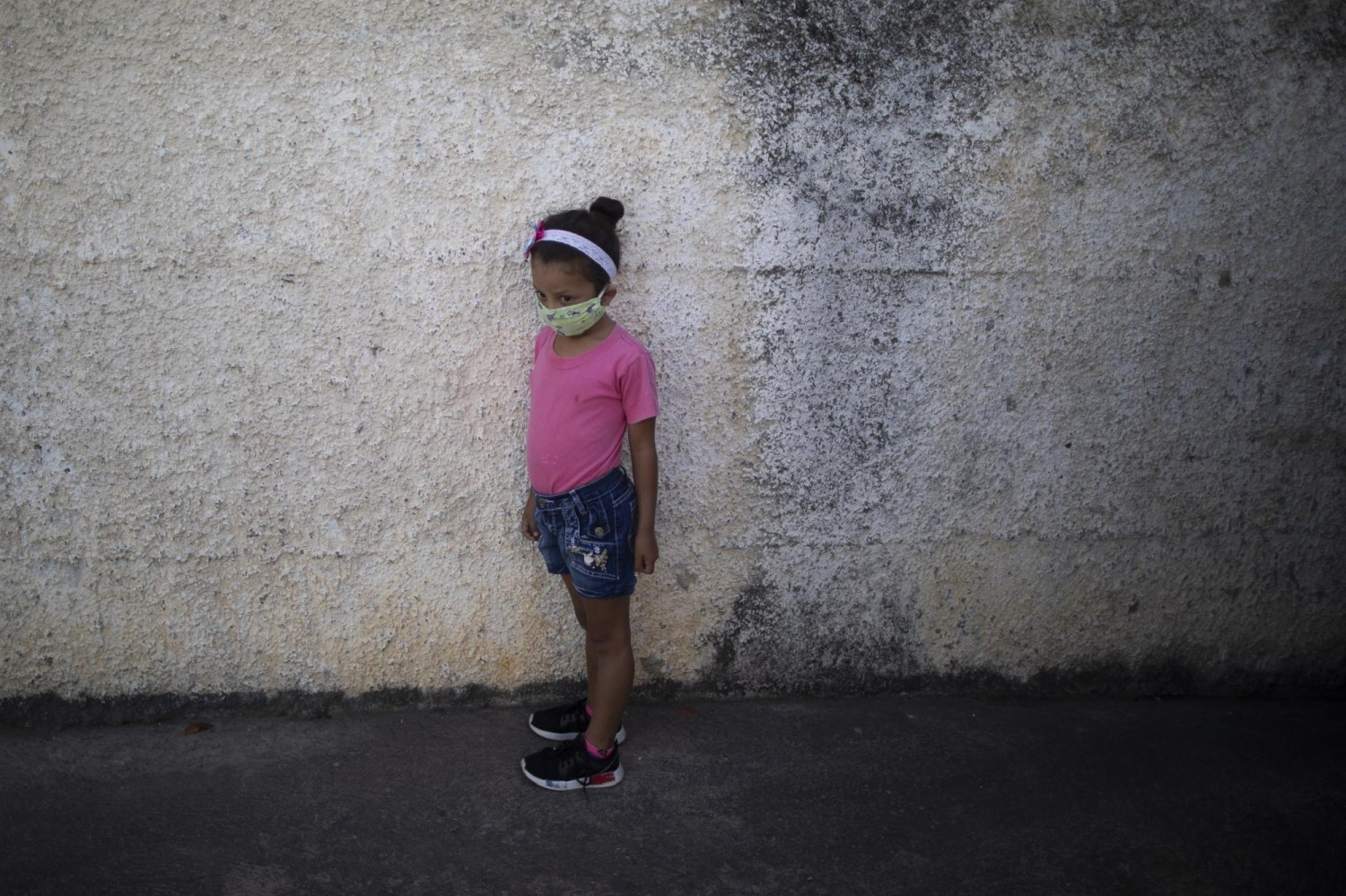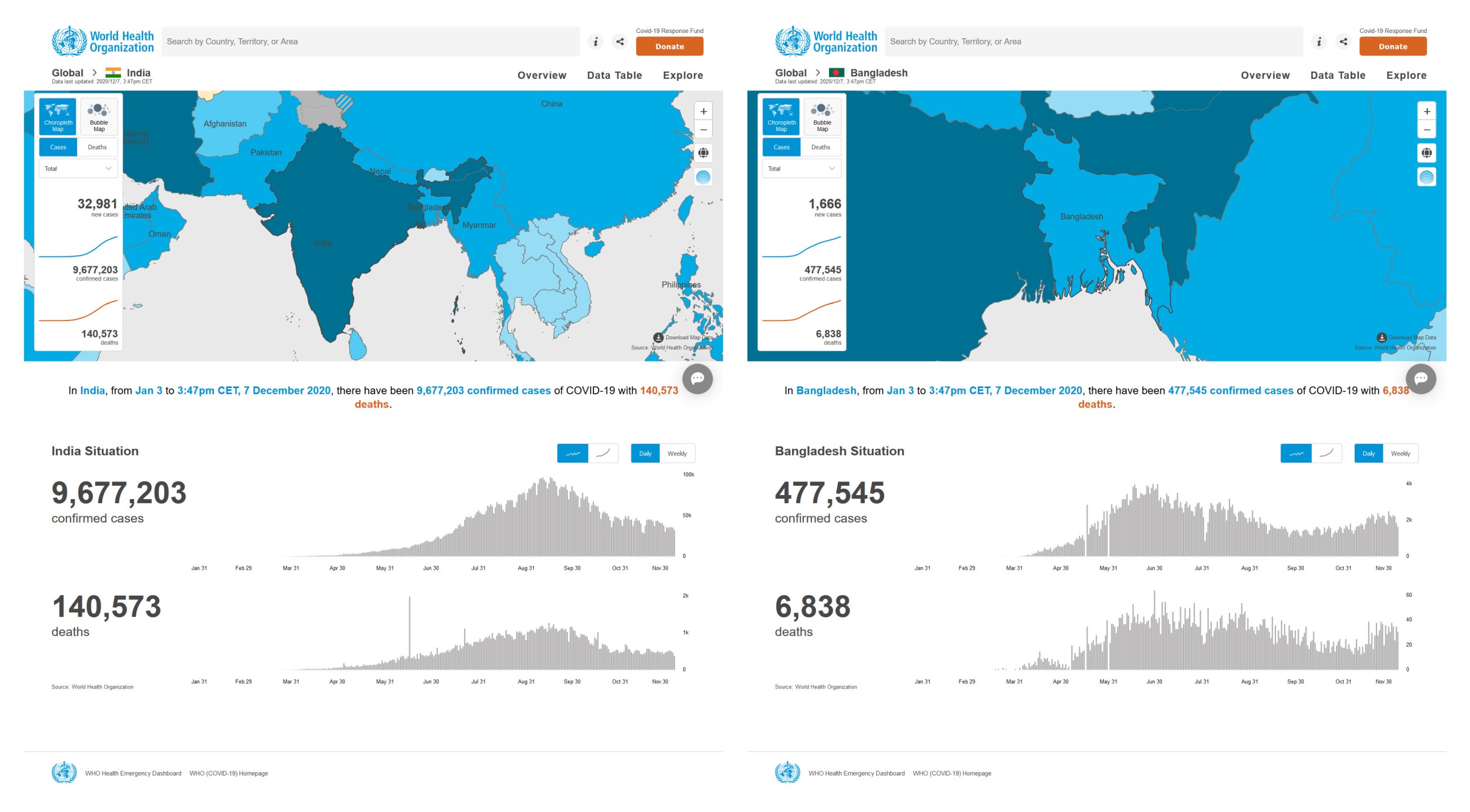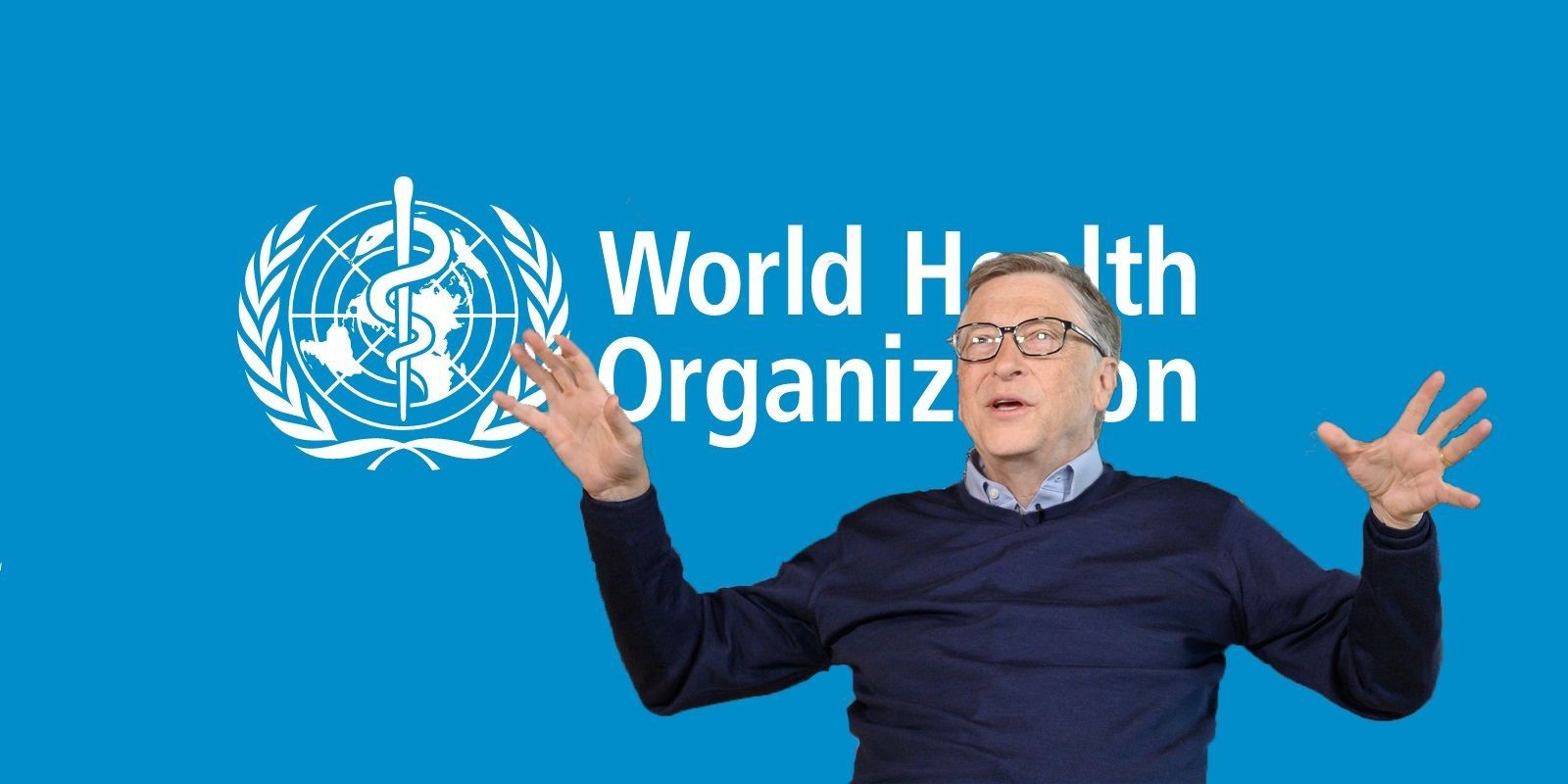Planet Lockdown
The perfect recipe for global disaster
As opposed to what governments and their media try to make the world believe, lockdowns have minimal effect on the spread of the virus while they are disastrous for the world economy, especially for the low to middle income class and the small to medium-sized businesses owned by the common taxpayers. The lockdowns were very beneficial for some billionaires with tremendous power and influence on global organizations like for example the World Health Organization which give their advice to governments around the world and to which governments comply without question. Covid almost only affects the old and vulnerable, see COVID-1984, so the first thing that comes to mind is that it would make much more sense to isolate and protect older and vulnerable people instead of the whole world and let the young and healthy build herd immunity naturally, subdue the virus, and keep the economy running.
Netherlands vs Belgium
A good example of lockdowns not being very effective is the comparison of the Netherlands with Belgium. Both countries are very similar and they are neighbours. The Netherlands has 17.4 million people and a density of 521/km2, Belgium has 11.5 million people and a density of 376/km2. During the first infection wave Belgium closed the border with the Netherlands and implemented a very strict inhumane China-style lockdown including for example restrictions on visiting family members and loved ones. Belgium also implemented many rules like for example wearing face masks in public areas early in 2020. The Netherlands is known for not having implemented a strict lockdown during the first wave, self-quarantine was voluntary and only during the second wave the Dutch government started urging people to start wearing controversial face masks*. The Netherlands was one of the few countries in Europe which allowed partners of Dutch citizens living outside the European Schengen area to enter the country. In Belgium this was not possible. Only during the second wave the Netherlands became more strict. The following data comes from the WHO...
Obviously, we cannot see much difference between the Belgian and Dutch curves. For both the virus infection number is much higher for the second wave while the death rate is significantly lower. During the second wave there was much more testing and as an epidemic progresses, the effective reproduction number of a virus declines, so the epidemic peaks and then decays. According to the head of the University of Washington’s Institute for Health Metrics and Evaluation COVID-19 killed about 0.6 percent of those infected during the second wave, down from a high of 0.9 percent during the first wave.* In a nationwide survey in Sweden the death rate dropped almost 50% from April to June.* So with time the virus looses power by itself, with or without lockdown, and herd immunity kicks in naturally. The following image shows the overall mortality pattern for the Netherlands and Belgium from 2015 to early 2021...
The similarities are obvious. Belgium with its strict lockdown did not do much better than the Netherlands with its soft lockdown, in fact Belgium even did significantly worse. On 7 December 2020 Belgium was world's number 1 with 1,492 deaths per million people while the Netherlands was number 33 with 566 deaths per million. Belgium has 50,963 cases per million and Netherlands has 32,901 cases per million. Based on hardcore observable reality it becomes very difficult to convince me with any theory of the necessity of a lockdown. At the very best a lockdown causes the spreading of a virus to somewhat slow down and spread out over time when implemented very early, but it also slows down herd immunity and worsens the economic disaster.
Death and destruction
Lockdowns cause excess deaths, for example by people not seeking emergency hospital treatment for a heart attack or other acute cardiovascular illness requiring urgent medical attention, either because they were afraid of contracting COVID-19 or were not referred for treatment.*
In response to the COVID-19 pandemic for example cancer screening has been suspended, routine diagnostic work deferred, and only urgent symptomatic cases were prioritised for diagnostic intervention and that there were substantial increases in the number of avoidable cancer deaths to be expected as a result of diagnostic delays due to the COVID-19 pandemic.
Excess deaths includes people who died due to for example increased unemployment and reduced public-sector expenditure on health care. In England and Wales alone there were 2,085 excess cardiovascular deaths from March 2 to June 30, an increase of 8%.* As a comparison the lesser financial crisis of 2008 had an estimated excess cancer-related death rate of 260,000 for the OECD countries because unemployment and reduced public-sector expenditure on healthcare are significantly associated with cancer mortality. So that's only "cancer-related" excess death and only "for the rich OECD countries".
There's a negative relation between isolation and health* because prolonged isolation weakens the immune system*. Loneliness is linked to poorer health outcomes in cancer patients. Loneliness and social isolation are twice as harmful to physical and mental health as obesity.* Suicide rates among young women have increased notably in Japan and South Korea, raising possible links to the prolonged coronavirus pandemic as it amplifies stress levels, worsens economic woes and aggravates feelings of loneliness and isolation.* Humans are inherently social and most psychiatric disorders involve some disruption of normal social behaviour. A logical consequence of the lockdown is a steep rise in mental depression and many more suicides all over the world. Almost 1 in 5 adults were experiencing some form of depression during the pandemic, almost doubling from around 1 in 10 before the pandemic.* In April 2022 a study was released that provides evidence for increased adolescent depressive symptoms and decreased life satisfaction as a result of the COVID-19 pandemic.
There's a relation between wealth and health. The stronger the crisis, the more people are plunged into financial problems, resulting in more future excess death. So if these inhumane lockdowns already have such a huge impact in rich OECD countries alone, then imagine the number of excess death including the poor developing countries. The governments and their media don't talk about these things simply because it doesn't fit with their narrative.
The infection fatality rate seems to be about the same as for influenza, but we have never introduced these drastic measures before, when we had influenza pandemics. And we cannot live with them for years to come. The World Bank has just estimated that the corona pandemic has caused an increase of about 100 million people living in extreme poverty. This is not because of COVID-19. It is because of the draconian measures we have introduced. We need a better strategy.
Rapid border closures, full lockdowns, and wide-spread testing were not associated with COVID-19 mortality per million people.
Strategies might not have saved any life in western Europe [and that] neighboring countries applying less restrictive social distancing measures (as opposed to police-enforced home containment) experience a very similar time evolution of the epidemic.
Inferences on effects of NPIs are non-robust and highly sensitive to model specification. Claimed benefits of lockdown appear grossly exaggerated.
While small benefits cannot be excluded, we do not find significant benefits on case growth of more restrictive NPIs. Similar reductions in case growth may be achievable with less‐restrictive interventions.
While this meta-analysis concludes that lockdowns have had little to no public health effects, they have imposed enormous economic and social costs where they have been adopted. In consequence, lockdown policies are ill-founded and should be rejected as a pandemic policy instrument.
By using the known connection between health and wealth, we estimate that lockdowns may claim 20 times more life years than they save.
A new study from the National Bureau of Economic Research, cited in The Australian and in a New York Times op-ed, reveals over 170,000 non-Covid excess deaths among young Americans in 2020 and 2021, most likely attributable to measures implemented to combat the coronavirus—i.e., deaths by lockdown.**
Obviously, lockdowns may have minimal impact on the spread of a virus, but their negative side effects are paramount and they slow down herd immunity and prolong misery. In May 2022 the WHO reported:the full death toll associated directly or indirectly with the COVID-19 pandemic (described as “excess mortality”) between 1 January 2020 and 31 December 2021 was approximately 14.9 million.* At the start of 2022 the total death toll according to the WHO was ~5,5 million people who died of COVID or with COVID.* That means that about 10 million people died because of for example the measures taken by the authorities, of which the lockdowns were of course the most destructive.
Economic crisis
A logical consequence of global lockdowns and the shutdown of the economies is a global crisis. These lockdowns are unprecedented and extreme. The website of the World Bank headlined with COVID-19 to plunge global economy into worst recession since World War II *. Everybody knew full well that the lockdowns would lead to mass unemployment all over the world. Travel, tourism and the small and medium-sized businesses are among the first and most affected sectors. According to the EU small and medium-sized enterprises are the backbone of Europe's economy. They represent 99% of all businesses in the EU. They employ around 100 million people.* In May 2020 European Commissioner for Economy Paolo Gentiloni said:it is now quite clear that the EU has entered the deepest economic recession in its history.Worse than the global financial crisis of 2008. In the meantime central banks are pumping more money than ever into the system* while the debt bubble keeps growing* and extreme inequality as well.
Food insecurity
In the aftermath of the global financial crisis of 2008, an estimated 13.5 million European households were tipped into food insecurity, while the current recession is already much deeper and is expected to last longer...
Pre-pandemic – and according to the USDA’s most recent report on food security in the U.S. – 37.2 million people, including 11.2 million children, did not have adequate access to nutritious food to live a healthy life. However, a recent Feeding America analysis demonstrates that this number is likely to grow by 17 million, including nearly seven million children. That means approximately 54 million people (1 in 6 people) may experience food insecurity in 2020, including 18 million children (1 in 4 children).*
Even before the onset of the coronavirus, about 670 million people in Africa, or half the continent’s population, were facing food insecurity, out of which 250 million people were severely food insecure. This problem has been exacerbated by the spread of COVID-19 and subsequent lockdown measures that introduced serious economic and food price shocks.*
In New York alone there were a million people who couldn’t afford food before the pandemic and now it’s doubled.* According to United Nations World Food Programme the coronavirus pandemic will see more than a quarter of a billion people suffering acute hunger by the end of the year.* The United Nations, the mastermind of these lockdowns via its World Health Organization, knew that millions of lives would likely be lost because of hunger due to these lockdowns.*
Child abuse
It has been indicated that compared to adults, this pandemic may continue to have increased long term adverse consequences on children and adolescents. The nature and extent of impact on this age group depend on many vulnerability factors such as the developmental age, current educational status, having special needs, pre-existing mental health condition, being economically under privileged and child/ parent being quarantined due to infection or fear of infection.
Eventhough the health of children and young parents is close to not impacted by the COVID-19 virus, as almost nobody is seriously impacted under the age of 65, they are hit hard by means of school closures and strict isolation measures. Parents working from home have to take care of their kids all day. Parents working outside home are forced to accommodate their children nevertheless. According to United Nations disruptions to services for preventing and responding to violence in the home, due to the global pandemic, has left children in more than 100 countries vulnerable to exploitation and abuse.* The rise in poverty will have a strong effect on children's well-being for years to come.* Widespread digitalisation mitigates the education loss caused by school-closures, but the poorest children are least likely to live in good home-learning environments with internet connection. Also this was foreseen by the United Nations before the power elite forced the governments to plunge the world in their desired lockdowns.
The Great Indian Lockdown
While India is one of the fastest growing economies in the world, it is also one of the most unequal countries.* On 27 May 2019, immediately after Narendra Modi became PM of India for the second time, Indian academician Pratap Bhanu Mehta said...
My worry is about the fact that we've reached a point where truth does not seem to matter. ... When people trust each other and distrust their leaders, you get democracy. When people distrust each other and completely trust their leaders, you get dictatorship. I think we are at the second moment right now.*
On 24 March 2020, around four hours before midnight, Prime Minister Narendra Modi announced the following...
source
This "democratic" dictator completely locked down all of India and only gave notice four hours before start. The Great Indian Lockdown was perhaps one of the most severe lockdowns in the world. Nobody knows how many more people were pushed further into poverty in India alone. And nobody in the West talks about this. The national lockdown lasted from 25 March to 31 May and the unlock phase lasted from 1 June until December. In neighbouring country Bangladesh a lockdown took place from 23 March to 30 May. Let's compare...
The shapes of the COVID-19 waves of each country are similar but the spread over the timeline differs somewhat. In Bangladesh the government basically terminated the lockdown on 30 May from one day to the other. That lockdowns don't work is shown by the curve which simply follows its "natural" course after May 30. In India the lockdown was only slowly decreased from 1 June onward. The shapes of the peaks are pretty similar though. A lockdown might slow down the rate of infection, but it remains speculation and the virus will follow its course sooner or later. On the other hand, the consequences for the economy and the population are known, they're disastrous. Early in September 2020 public health specialists in India called on the government to adopt a more pragmatic approach to testing for covid-19, amid evidence of widespread prevalence of infection. In other words, the Great Indian Lockdown was a disaster*. It didn't prevent infection and it brought misery to untold numbers of people and destroyed lives.
Of 86 million salaried jobs in India an estimated 21 million salaried employees have lost their jobs by the end of August 2020.* Lots of people in India are poor and live in the most densely populated cities in the world with the most high density slums where hygiene is poor and a lockdown cannot possibly work in any way. Nobody is going to stop a very infectious virus from spreading quickly there. The idea alone is wicked madness.
It seems that the main reason why we don't see many more deaths in India is because many Indian people have a higher level of resistance to diseases in general and when poor people experience light flu symptoms they simply continue to work because they need the money for survival. Lockdowns are incredibly inhumane and evil, especially in these kind of countries. So why are the power elite pushing for lockdowns?
Narendra Modi happens to be a big friend of multi-billionaire Bill Gates. Indian academician and columnist Madhav Das Nalapat nicknamed Bill Gates the "lockdown enthusiast" and said the following about him...
The founder of Microsoft has become an ubiquitous influence in the global health industry, and as such, his apparent recommendation in favour of a comprehensive lockdown wherever the novel coronavirus made an appearance would have been extraordinarily persuasive. At the same time, the leadership of the prestigious Indian Council of Medical Research seems to have been unanimous in urging just such lockdown. The head of the Bill & Melinda Gates Foundation was among the first international heavyweights to compliment Modi on the Great Indian Lockdown. Another was the 45th President of the US, Donald Trump and a third was Director-General Tedros of the WHO, who has been associated with Gates for decades.*
The Indian Council of Medical Research is linked to Bill Gates* as well.
CONspiracy
The top five U.S. billionaires—Jeff Bezos, Bill Gates, Mark Zuckerberg, Warren Buffett and Larry Ellison—saw their wealth grow by a total of $75.5 billion, or 19%. Together they captured 21% of the total wealth growth of all 600-plus billionaires in the last two months. The fortunes of Bezos and Zuckerberg together grew by nearly $60 billion, or 14% of the $434 billion total.*
While the world is suffering, especially the poor and low to middle income class, the COVID-19 crisis and the lockdowns were very beneficial for the billionaires.
Gates said that his top priority would be to keep people across America indoors to ‘flatten the curve’ of the pandemic; in other words, slowing down the rate at which the virus is spreading.*
But we know that the effect on the virus of these utterly destructive lockdowns is minimal. Working from home for billionaires like Bill Gates is nothing compared to the billions of poor people who barely have a roof over their heads, as do many in India. So the richest people on earth and the power elite are fanatic proponents of lockdowns. Would that be because these elite care so much for everybody's health and wellbeing around the world or would it make more sense to believe it's because the increase in extreme inequality works extremely in their favor?
The controversial ‘Global Goalkeeper’ award was handed to Narendra Modi by Bill Gates at a ceremony at the United Nations on 25 September to mark contributions to achieving the Global Goals for 2030 known as the Sustainable Development Goals.*
See Agenda 2030. While the world is suffering billionaires like Bill Gates make profit from the global lockdowns and pretend to be compassionate with all the people suffering in the world while in the meantime they support inhumane authoritarian leaders around the world who oppress millions of poor to extremely poor people who barely have a roof over their heads. And their own globalist friends at the United Nations give these people awards in order to make the ignorant sheeple at home think the best of them.
Bill Gates is known as the main sponsor of the World Health Organization*. see UNhealth. He has lucrative plans to vaccinate the whole world*. Before that he was known as founder and chairman of the company Microsoft which was involved in an antitrust law case for illegally maintaining its monopoly position in the PC market. After the computer virus business he became involved in the much more lucrative and deadly biological virus business. Through his Bill & Melinda Gates Foundation he presents himself as philanthropist while making huge profits because in reality philanthropy by the ultra-rich is all about return on investment, profit, and tax evasion. By the ignorant and morally depraved who buy into the propaganda of the mainstream media he is of course seen as a hero*. A smart billionaire like Bill Gates invests millions in media outlets to promote his global agenda.*
source
The lockdowns were extremely destructive to humanity and the global economy while they were extremely beneficial to the power elite. In April 2022 the Chief Medical Advisor in the US, Anthony Fauci, said:You use lockdowns to get people vaccinated, so that when you open up you won't have a surge of infections because you're dealing with an immunologically naive population.* Indeed, lockdowns prevent herd immunity naturally, and by preventing natural immunity the power elite can impose their desired and lucrative vaccinations on the naive populations. See VacciNATION.

